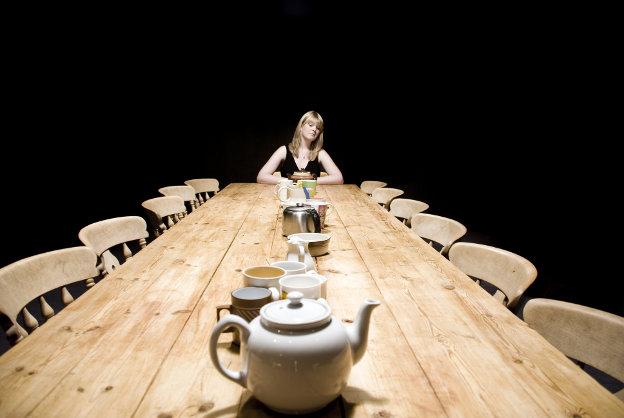Breakfast, brunch, lunch, tea, dinner, supper… Well, at least we are all agreed on breakfast. But what does ‘tea’ mean to you? A brew with biccies or an evening meal?
There are around twelve of us gathered around a nice old-fashioned kitchen table, a decent solid pine-wood table, not one of those lightweight things from IKEA. We are welcomed by Faye, who’s wearing a neat little blue dress and apron, with a hostess trolley for her bits and bobs. There’s a hotch-potch of teapots on the table, including a cheerful spotty one, and a metal one with electrical tape on the handle (to make it less ‘burny’, as Faye’s Gran said when she lent it to her). So there’s tea, and milk in jugs, and sugar bowls, and plates of Bourbon biscuits and Custard Creams (Britain’s favourite biscuit!).
As we take our tea, the table acts as a conduit through space and time. Mixing autobiography, true-life stories, and gentle philosophical musings, solo performer Faye Draper bring us an endearing show built around an immersive ‘British tea-time’ experience.
The tea-time theme broadens out to include other tables and other meals – and we are cast in a variety of roles. Look, there’s Grandma at the head of the table (where Grandad always longed to be), and over there little Mark, aged 8, who is playing with his peas, and on this side Aunty Selina. So it must be Christmas, because Aunty Selina only ever sits down on Christmas Day – she’s about to announce the start of the meal, cautioning everyone to have their party poppers ready, and she makes her usual health-and-safety announcement about not ‘popping’ too early because of Grandad’s pacemaker, and someone always does, and Grandad always fakes a heart attack, on cue. Oh and now we are in a restaurant, and we wonder who the man is who always sits alone, no phone to distract him, no book to read. Joe’s mum is here in the restaurant and she accidentally leaves her new-born baby in his car seat under the table, panicking when she gets to the car with no baby in tow.
The teapots, jugs, mugs and biscuits now morph into a wedding party, with Faye struggling to sort out the seating arrangements: ‘he can’t sit on that side of her because that’s her deaf ear’.
And so you will have gathered that what we have presented here are tiny tales of everyday life – nothing epic, nothing more dramatic than a baby misplaced for a matter of moments, or someone inadvertently sitting at the head of the table when they shouldn’t – but it all makes for really engaging theatre. Everything is just so – it is a deceptively clever piece in its dramaturgical structure. Themes are circled round and returned to, small pieces of text repeated again and again to give a poetic rhythm to the piece (Mark and his peas become something of an anchor point!).
If there is a small quibble it is on the integration of a section in which the audience are given salt cellars and asked to draw dinner settings, and then each given a place to reference. These places – Bristol, London, Devon, Newcastle, Blackburn – are obviously places of significance to Faye, but exactly how and why is glossed over, which given the care and attention to every other section is a little puzzling. That said, it was great to get to draw with salt, and to look afterwards at a table covered in salt plates sporting salt sheep, shopping trolleys, bridges and Big Wheels!
Beautifully written (by Faye and the show’s co-creator, Alex Kelly of Third Angel), beautifully performed – a very lovely and loving reflection on lives lived ‘up north’.


